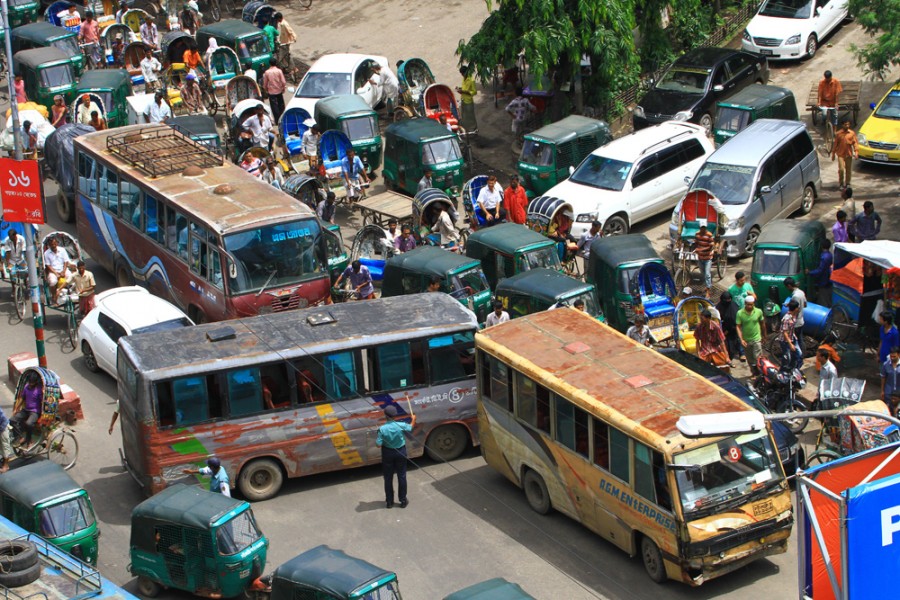
Published :
Updated :

Hundreds and thousands of commuters are compelled to spend two to three hours a day on roads in Dhaka, except on weekend, due to chaotic traffic. As there are more cars and motorbikes on roads, there are more traffic congestions. The number of newly registered private cars almost doubled in the past seven years, from 8,187 in 2012 to 16, 319 in 2018. At the same time, the number of newly registered motorcycles nearly quadrupled to 0.39 million from 0.10 million. Again there are unlimited numbers of non-motorised vehicles, rickshaws to be precise.
A growing number of motorised private vehicles clearly reflects the inadequate public transport and adding to the already congested roads. Unplanned expansion of the city coupled with unruliness of motorised vehicles and mismanagement of traffic makes things worse. As a result, spending valuable times on roads becomes their fate accompli. A large number of these commuters include students, professionals and workers. To reach their desired destinations on time, most of them -worried as they are -- have to start quite early. Thus they have to sacrifice their adequate sleep time in many cases. Again, travel by public buses where minimum facilities are lacking and sitting on risky motorbikes turn terrible. Those who are travelling by car are also not always better-off as bad traffic congestion doesn't spare them.
Longer stay on traffic congestion is very stressful for mind and body. It reduces the energy level at the beginning of the day and makes them tired. So, people have to struggle more to concentrate on their respective works after reaching destinations. As a result, they are slowly losing their productivity.
Lower productivity turns businesses less-competitive. Employees and workers have to put extra effort to run business or factories smoothly and deliver services to customers. As traffic congestion on roads takes a heavy toll on supply chain especially transporting goods from factory to sales centres or ports, workers have to bear an additional burden to compensate the loss by working extra time in many cases. The ultimate outcome is loss of productivity of workers and professionals in the long-run. Most of the time, they need to pay attention on keeping their current performance right. Putting effort to improve productivity becomes challenging.
Students also face difficulty to concentrate on lectures in their classes after a gruelling journey. They have to fight all the way on the return journey. The unnecessary trouble gradually erodes their stamina.
In fact, loss of productivity is significantly linked with traffic congestion which makes mobility of people difficult, costly and stressful. Though traffic management is more challenging in overpopulated countries like Bangladesh, it is not impossible if proper planning and strict enforcement of rules are there. A well designed public transport system in combination with bus and rail can significantly reduce congestions on roads and contain the erosion of productivity. A cost-effective solution is there. The policymakers need to take the issue seriously. Instead of focusing on mega infrastructure projects, efficient use of current infrastructure with some improvement may bring a better outcome.
asjadulk@gmail.com


 For all latest news, follow The Financial Express Google News channel.
For all latest news, follow The Financial Express Google News channel.